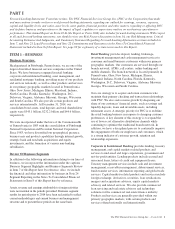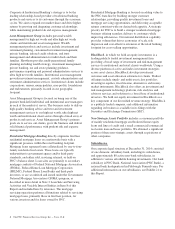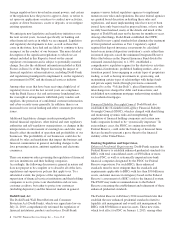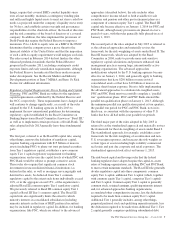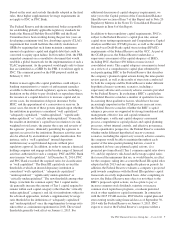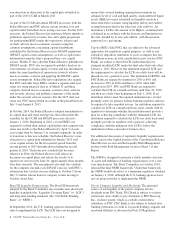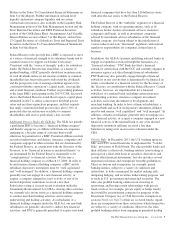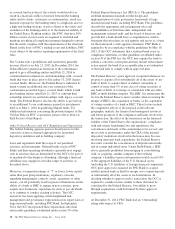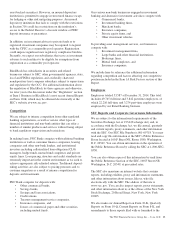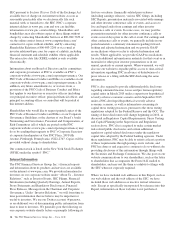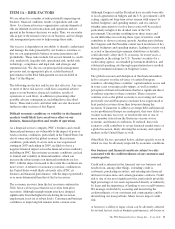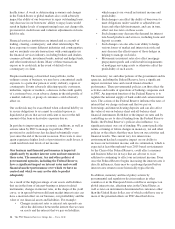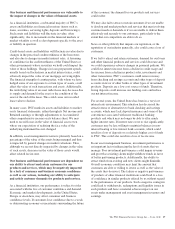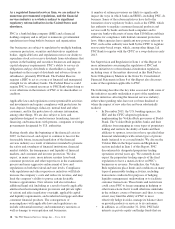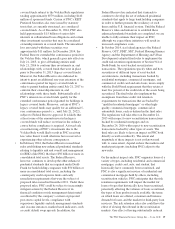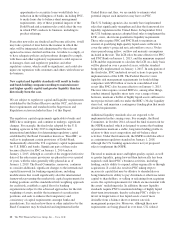PNC Bank 2014 Annual Report Download - page 29
Download and view the complete annual report
Please find page 29 of the 2014 PNC Bank annual report below. You can navigate through the pages in the report by either clicking on the pages listed below, or by using the keyword search tool below to find specific information within the annual report.
Because of PNC’s ownership interest in BlackRock,
BlackRock is subject to the supervision and regulation of the
Federal Reserve.
FDIC Insurance and Related Matters. PNC Bank is insured by
the FDIC and subject to premium assessments. Regulatory
matters could increase the cost of FDIC deposit insurance
premiums to an insured bank as FDIC deposit insurance
premiums are “risk based.” Therefore, higher fee percentages
would be charged to banks that have lower capital ratios or
higher risk profiles. These risk profiles take into account,
among other things, weaknesses that are found by the primary
banking regulator through its examination and supervision of
the bank and the bank’s holdings of assets or liabilities
classified as higher risk by the FDIC. For example, the
amount of brokered deposits (as defined under the FDI Act)
held by an insured depository institution can adversely affect
the institution’s deposit insurance assessments. A negative
evaluation by the FDIC or a bank’s primary federal banking
regulator could increase the costs to a bank and result in an
aggregate cost of deposit funds higher than that of competing
banks in a lower risk category. The methodology for the
deposit insurance base calculation currently uses average
assets less average tangible equity.
On January 5, 2015, the FDIC issued guidance in the form of
frequently asked questions regarding the definition of
brokered deposits under the FDI Act, as well as the acceptance
and regulatory reporting of brokered deposits by insured
depository institutions. Federal banking laws and regulations
apply a variety of requirements or restrictions on insured
depository institutions with respect to brokered deposits. For
example, only a “well capitalized” insured depository
institution may accept brokered deposits without prior
regulatory approval and brokered deposits are generally
subject to higher outflow assumptions than other types of
deposits for purposes of the LCR.
Resolution Planning. Dodd-Frank requires BHCs that have
$50 billion or more in assets, such as PNC, to periodically
submit to the Federal Reserve and the FDIC a resolution plan
that includes, among other things, an analysis of how the
company could be resolved in a rapid and orderly fashion if
the company were to fail or experience material financial
distress. The Federal Reserve and the FDIC may jointly
impose restrictions on a covered BHC, including additional
capital requirements or limitations on growth, if the agencies
jointly determine that the company’s plan is not credible or
would not facilitate a rapid and orderly resolution of the
company under the U.S. Bankruptcy Code (or other applicable
resolution framework), and additionally could require the
company to divest assets or take other actions if the company
did not submit an acceptable resolution plan within two years
after any such restrictions were imposed. The FDIC also has
adopted a rule that requires large insured depository
institutions, including PNC Bank, to periodically submit a
resolution plan to the FDIC that includes, among other things,
an analysis of how the institution could be resolved under the
FDI Act in a manner that protects depositors and limits losses
or costs to creditors of the bank in accordance with the FDI
Act. Depending on how the agencies conduct their review of
the resolution plans submitted by PNC and PNC Bank, these
requirements could affect the ways in which PNC structures
and conducts its business and result in higher compliance and
operating costs. PNC and PNC Bank submitted their 2014
resolution plans under these rules in December 2014.
CFPB Regulation and Supervision. As noted above, Dodd-
Frank gives the CFPB authority to examine PNC and PNC
Bank for compliance with a broad range of federal consumer
financial laws and regulations, including the laws and
regulations that relate to credit card, deposit, mortgage,
automobile loans and other consumer financial products and
services we offer. In addition, Dodd-Frank gives the CFPB
broad authority to take corrective action against PNC Bank
and PNC as it deems appropriate. The CFPB also has the
power to issue regulations and take enforcement actions to
prevent and remedy acts and practices relating to consumer
financial products and services that it deems to be unfair,
deceptive or abusive, and to impose new disclosure
requirements for any consumer financial product or service.
These authorities are in addition to the authority the CFPB
assumed on July 21, 2011 under existing consumer financial
law governing the provision of consumer financial products
and services. While the CFPB concentrated much of its initial
rulemaking efforts on a variety of mortgage related topics
required under Dodd-Frank, including ability-to-repay and
qualified mortgage standards, mortgage servicing standards,
loan originator compensation standards, high-cost mortgage
requirements, appraisal and escrow standards and
requirements for higher-priced mortgages, and disclosure
requirements, it is also engaged in rulemakings relating to
other products and services offered by PNC Bank, including
prepaid cards.
In January 2014, new rules issued by the CFPB for mortgage
origination and mortgage servicing became effective. The
rules require lenders to conduct a reasonable and good faith
determination at or before consummation of a residential
mortgage loan that the borrower will have a reasonable ability
to repay the loan. The regulations also define criteria for
making Qualified Mortgages which entitle the lender and any
assignee to either a conclusive or rebuttable presumption of
compliance with the ability to repay rule. The new mortgage
servicing rules include new standards for notices to
consumers, loss mitigation procedures, and consumer requests
for information. Both the origination and servicing rules create
new private rights of action for consumers in the event of
certain violations. In August 2015, broad new regulations take
effect concerning the disclosures we provide to prospective
residential mortgage customers. These regulations, among
other things, require the provision of new disclosures near the
time a prospective borrower submits an application and three
days prior to closing of a mortgage loan. In addition to the
The PNC Financial Services Group, Inc. – Form 10-K 11


